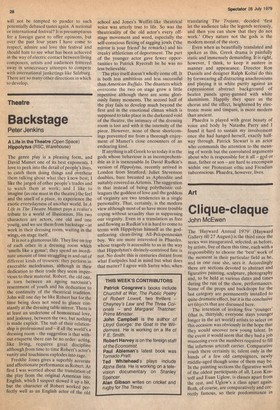Theatre
Backstage
Peter Jenkins
A Life in the Theatre (Open Space) Hippolytus (RSC, Warehouse) The genre play is a pleasing form, and David Mamet one of its best exponents. I love to peek into the detail of people's lives, to catch them doing things and overhear them talking about what they know best; I like the jargoh of other people's trades and to watch them at work;. and I like to imagine (as one must in the theatre) the feel and the smell of a place, to experience the exotic everydayness of another world. In A Life in The Theatre Mamet pays a realist's tribute to a world of illusionism. His two characters are actors, one old and one young, and we see them from backstage —at work in their dressing room, waiting in the wings, on stage itself.
It is not a glamorous life. They live on top of each other in a dressing room which `smells like a gymn'; they spend an inordinate amount of time struggling in and out of different kinds of trousers; they perform in execrable melodramas, although in their dedication to their trade they seem impervious to their material. Robert, the old one, is torn between an ageing narcissist's resentment of youth and his dedication to the continuity of the theatrical tradition. John will one day be like Robert but for the time being does not need to glance constantly at the dressing table mirror. There is at least an undertone of homosexual love, and jealousy, between the two, but nothing is made explicit. The nub of their relationship is professional and — if all the world's a dressing room — the suggestion is that without etiquette there can be no order: acting, like living, requires great discipline although from time to time Robert's actor's vanity and touchiness explodes into rage. Freddie Jones gives a superbly accurate and affectionate performance as Robert. At first I was worried about the translation of the play from the original American into English, which I suspect slowed it up a bit, but the character of Robert worked per. fectly well as an English actor of the old school and Jones's Wolfitt-like theatrical voice was utterly true to life. So was the theatricality of the old actor's every offstage movement and word, especially the self-conscious flexing of sagging jowls ('the mirror is your friend' he remarks) and his creaky athleticism of deportment. The part of the younger actor gave fewer opportunities to Patrick Ryecraft be he was no less believable.
The play itself doesn't wholly Come off. It is both less ambitious and less successful than American Buffalo. The disasters which overcome the two on stage grow a little repetitive although there are some gloriously funny moments. The second half of the play fails to develop much beyond the first and in the emotional climax which is supposed to take place in the darkened void of the theatre, the intimacy of the dressing room is lost and with it the intensity of the piece. However, none of these shortcomings prevented me from a thorough enjoyment of Mamet's close encounters of an endearing kind.
If anything is all Greek to us today it is the gods whose behaviour is as incomprehensible as it Is inexcusable. In David Rudkin's version of Hippolytus, recently arrived in London from Stratford, Juliet Stevenson doubles, bare breasted as Aphrodite and suitably covered as Artemis. The suggestion is that instead of being polytheistic colleagues the goddess of love and the goddess of virginity are two tendencies in a single personality. That, certainly, is the modern view although most of us have more trouble coping without sexuality than in suppressing our virginity. Even in a translation as free and flowing as Rudkin's it is hard to come to terms with Hippolytus himself as the godunfearing clean-living All-Peloponnesian boy. We are more interested in Phaedra, whose tragedy is accessible to us in the way that Hippolytus's divinely-contrived fate is not. No doubt this is centuries distant from what Euripides had in mind but what does that matter? I agree with Sartre who, when translating The Trojans, decided 'first let the audience take the legends seriously, and then you can show that they do not work.' Obey nature not the 'gods is the modern moral of the story.
Even when as beautifully translated and spoken as this, Greek drama is painfully static and immensely demanding. It is right, however, I think, to keep it austere in manner and appearance. Director Ron Daniels and designer Ralph Koltai do this by forswearing all distracting anachronisms and playing it in white purity against an expressionist abstract background of beaten panels spray-gunned with white aluminium. Happily they spare us the chorus and the effect, heightened by electronic music and timpani, is more modern than ancient.
Phaedra is played with great beauty of voice and body by Natasha Parry and I found it bard to sustain my involvement once she had hanged herself, exactly halfway through. Patrick Stewart is an actor who commands the attention to the meaning of words but the convoluted arguments about who is responsible for it all — gpd or , man, father or son — are hard to encompass within our Protestant ethic and Freudian subconscious. Phaedra, however, lives.






































 Previous page
Previous page